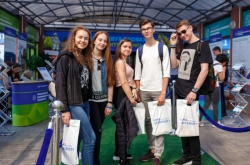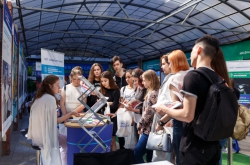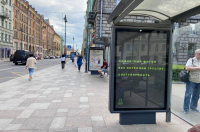More than 70 applications were submitted by school students from St. Petersburg, Moscow, Veliky Novgorod, Vladivostok, Petropavlovsk-Kamchatsky, Voronezh, Kaliningrad, Tver, Tomsk, Ulyanovsk, Chelyabinsk, Yuzhno-Sakhalinsk, and other Russian cities.
There was only one criterion for participation: you have to get the minimal Unified State Exam score (in most cases, that would be at least 60 points in every subject). Then, from June 20 to July 20, 2018, the participants were asked to create a profile on the contest's website, to which they had to enclose their portfolio and motivation letter.
How were the winners chosen?
There was no predefined number of positions covered by the university; the winners were selected by the contest committee comprised of ITMO Schools and Admission Committee members.
“When assessing the participants’ works, we paid special attention to whether the submitted projects were important achievements and whether they were conducted by the participants themselves. Apart from that, applicants were required to have a good understanding of their how their studies at ITMO will contribute to their future development,” comments Pavel Kustarev, Dean of the Faculty of Software Engineering and Computer Systems.

Results
14 school students from St. Petersburg, Blagoveshchensk, and Yuzhno-Sakhalinsk were selected by the contest committee. Alexander Blashenkov from Yuzhno-Sakhalinsk and Danil Zmievsky from Blagoveshchensk even presented their own software projects: Alexander developed a web application, while Danil created a prototype of a bilingual electronic dictionary.
Among the winners from St. Petersburg are nine school students: Nadezhda Maksimenko, who presented her research project on microplastic in natural water systems; Ekaterina Mashina, who told the commission about the results of her project on the methods of information support and premedical care; Elizaveta Punchenko, a participant of ITMO University's Young Scientists Conference, Sergei Fedorov, the winner of the 28th Sakharov Readings International Scientific Conference; Ignatiy Ponomarenko, a second-prize winner of the ITMO VK Competition, who invented a graphic editor; and Daniil Shahbanov, who developed a high-level search algorithm.

Among the winners are several talented robot technicians who scored first places at numerous Russian and international competitions, such as Alexander Dupak, who developed a mobile robotic platform, Daniil Nechaev, the winner of the World Robot Olympiad 2017, and Alexander Leader, the winner of the First Tech Challenge (FTC) and Asia Pacific robotics competitions.

It is important to note that ITMO.STARS winners will study like the rest of the students: the university treats all students equally. Having successfully completed the end-of-term examinations, they will be able to transfer to state-sponsored positions.
“What we liked the most about the competition were the participants’ motivation letters. We’ve read them all, and sometimes it was hard to believe that school children can write something like this. They not only want to study at ITMO, they love our university and want to advance and develop it. Some of the competition’s winners got state-sponsored positions. Next year, we plan to make ITMO.STARS available for both Bachelor’s, Master’s, and PhD students,” says Anna Veklich, first vice-chair of the Admission Board.




